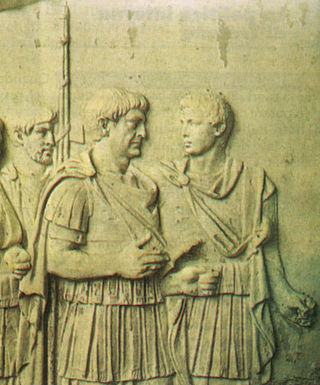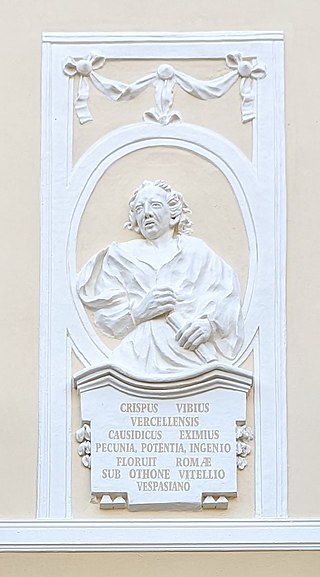Related Research Articles

Lucius Licinius Sura was an influential Roman Senator from Tarraco, Hispania, a close friend of the Emperor Trajan and three times consul, in a period when three consulates were very rare for non-members of the Imperial family. The dates of two of these consulates are certain: in 102 and 107 AD he was consul ordinarius; the date of his first consulate, as a suffect consul has been debated. Fausto Zevi postulated that he was also suffect consul in 97, based on a plausible restoration of part of the Fasti Ostienses, which reads "..]us". However, two more recently recovered fragments of military diplomas show that the name of this consul is L. Pomponius Maternus, who is otherwise unknown. Most authorities have returned to endorsing C.P. Jones' surmise that Sura was consul for the first time in the year 93. He was a correspondent of Pliny the Younger.
Gnaeus Arrius Antoninus was the maternal grandfather of the Emperor Antoninus Pius.
Manius Laberius Maximus was a Roman senator and general, who was active during the reigns of Domitian and Trajan. He was twice consul: the first time he was suffect consul in the nundinium of September to December 89 AD as the colleague of Aulus Vicirius Proculus; the second time as ordinary consul in 103 as a colleague to the Emperor Trajan.

Gaius Julius Quadratus Bassus (70–117) was a Roman senator and general. He rose from provincial aristocratic origins to occupy the highest offices of Rome. He served as a legionary commander and as imperial governor of Judea, Cappadocia, Galatia, Syria and Dacia. He is known to have been active under Trajan in the Dacian and Parthian Wars. Bassus was suffect consul in the nundinium of May to August 105 with Gnaeus Afranius Dexter as his colleague.
Gaius Julius Severus was a Roman senator and aristocrat of the second century. He was suffect consul around the year 138.

Lucius Junius Quintus Vibius Crispus was a Roman senator and amicus or companion of the Emperors, known for his wit. He was a three-time suffect consul.
Titus Clodius Eprius Marcellus was a Roman senator, twice consul, best known for his prosecution of the Stoic senator Thrasea Paetus and his bitter quarrel with Helvidius Priscus. Eprius was also notorious for his ability to ingratiate himself with the reigning Emperors – especially Nero and Vespasian – and his hostility to any senatorial opposition, but in the last year of Vespasian, in circumstances that remain obscure, he was accused of treason and committed suicide.
Gaius Avidius Nigrinus was a Roman senator who lived between the 1st and 2nd centuries. Nigrinus served as suffect consul for the nundinium of April to June 110 with Tiberius Julius Aquila Polemaeanus as his colleague.
The gens Caecinia was a plebeian family of Etruscan origin at ancient Rome. Members of this gens are first mentioned in the time of Cicero, and they remained prominent through the first century of the Empire, before fading into obscurity in the time of the Flavian emperors. A family of this name rose to prominence once more at the beginning of the fifth century.
The gens Lartia, also spelled Larcia, or rarely Largia, was a patrician family at ancient Rome, whose members earned great distinction at the beginning of the Republic. Spurius Larcius was one of the two companions of Horatius, who defended the Pons Sublicius against Lars Porsena in 508 BC. A few years later, Titus Larcius became the first Roman dictator. However, the gens all but vanishes from history after this period. A family of the same name existed in the late Republic and under the early Empire, but their relationship to the earlier Lartii is unknown.
The gens Cluvia was a plebeian family at ancient Rome, known from the later Republic, and early imperial times. The first member of the gens to achieve prominence was Gaius Cluvius Saxula, praetor in 175 and 173 BC.
Gaius Antius Aulus Julius Quadratus was a Roman senator from Pergamon, who was appointed consul twice, in AD 94 and then in AD 105, the first senator from the Eastern Mediterranean to achieve the ordinary consulship.
Gaius Laecanius Bassus Caecina Paetus was a Roman senator of the early Roman Empire, whose known career flourished under the reign of Vespasian. He was suffect consul in the nundinium of November to December AD 70 as the colleague of Lucius Annius Bassus.
Tiberius Julius Candidus Marius Celsus was a Roman senator who lived during the Flavian dynasty. Contemporary sources, such as the Fasti Ostienses, the Acta Arvalia and a letter of Pliny the Younger, refer to him as Tiberius Julius Candidus. He was twice consul.
Marcus Cornelius Nigrinus Curiatius Maternus was a Roman senator and general during the reign of Domitian. He was suffect consul during the nundinium of September to October AD 83 with Lucius Calventius Sextus Carminius Vetus. Although some experts consider him a rival with Trajan as heir apparent to the emperor Nerva, he is primarily known from inscriptions.
Aulus Larcius Priscus was a Roman Senator and general who held several posts in the emperor's service. His career is unusual in that Priscus held a very senior post — governor of Syria — at an unusually early point in his life. He was suffect consul for the nundinium of October to December 110 with Sextus Marcius Honoratus as his colleague. Priscus is known almost entirely from inscriptions.
Marcus Pedo Vergilianus was consul at the beginning of AD 115, during the reign of Trajan. He died in an earthquake toward the end of that year. His true family name is uncertain, his gens being omitted from surviving versions of his name.
Titus Julius Maximus Manlianus was a Roman senator active in the early second century who held a number of offices in the emperor's service. He was suffect consul for the nundinium July to September 112 as the colleague of Publius Stertinius Quartus. His complete name was Titus Julius Maximus Manlianus Brocchus Servilianus Aulus Quadronius [Verus?] Lucius Servilius Vatia Cassius Cam[ars].
Marcus Junius Homullus was a Roman senator active in the late 1st and early 2nd centuries AD, who occupied a number of offices in the imperial service. He also served as suffect consul for the nundinium of September to December 102 as the colleague of Lucius Antonius Albus. Bernard Rémy notes that his cognomen, "Homullus", appears primarily in Italy, so this may be where his origins lie.
Titus Haterius Nepos was a Roman senator and general, who held several imperial appointments during the reign of Hadrian. He was suffect consul in the year AD 134, immediately succeeding Lucius Julius Ursus Servianus as the colleague of Titus Vibius Varus. According to an inscription found in Fulginiae in Umbria, surmised to be his home town, he received triumphal ornaments for an unspecified military victory, as well as attesting his full name is Titus Haterius Nepos Atinas Probus Publicius Matenianus.
References
- ↑ Werner Eck, Peter Weiß, "Hadrianische Konsuln. Neue Zeugnisse aus Militärdiplomen", Chiron , 32 (2002), p. 482
- 1 2 Eck, "Miscellanea prosopographica", Zeitschrift für Papyrologie und Epigraphik , 42 (1981), pp. 245f
- ↑ Cassius Dio, Romaike Historia, 62.21.2
- ↑ Pliny the Younger, Epistulae , III.14
- ↑ Eck, "Jahres- und Provinzialfasten der senatorischen Statthalter von 69/70 bis 138/139", Chiron , 12 (1982), pp. 152-157